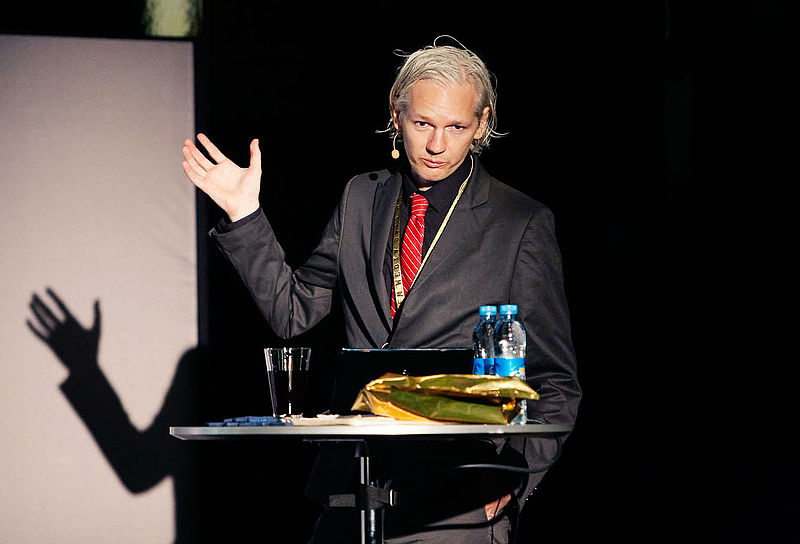
In an Op Ed in last weekend’s Ottawa Citizen, I commented on the Catch 22 situation the UK government now finds itself in with respect to Julian Assange. Earlier this week, the Foreign Minister of Ecuador, Ricardo Patino, announced his government’s decision to provide ‘diplomatic asylum’ to the founder of the Wikileaks website, who took up residence in the embassy in mid June to avoid extradition to Sweden to face questioning related to alleged sexual offences.
In one sense, nothing has changed. British Foreign Secretary William Hague maintained yesterday that despite the decision of officials in Quito (the Ecuadorean capitol) to grant asylum, the UK will not allow Mr. Assange safe passage to Ecuador. He also rightly pointed out that the principle of ‘diplomatic asylum’, while recognized by Latin American states in a treaty from the 1950s, is not established as a general principle of international law.
Even if it were, it is debatable whether Assange’s situation warrants application of the principle of asylum, the purpose of which is to protect an individual from persecution or torture if he is sent back to his country of origin. Most lawyers agree that the principle was not designed to allow individuals to escape regular processes of justice. When Sweden issued its European arrest warrant for Mr. Assange, British judges granted him bail while the case was being considered. Assange breached those bail conditions by entering the Ecuadorean embassy, thereby making himself liable to arrest. Interestingly, today’s Guardian newspaper (the most liberal broadsheet in the UK) criticized Assange for appropriating the badge of asylum-seeker.
Of course, Assange maintains that the real issue is the prospect of his further transfer to the U.S., to face charges of espionage for the leak of thousands of pages of classified government documents. But this concern, though not unfounded, is starting to lose force. As Swedish officials have argued, their own legislation, along with their obligations under the European Convention on Human Rights, stipulate that they cannot extradite an individual to a country where he/she might face the death penalty.
One’s position on the Assange case effectively hinges on whether one believes that: a) the U.S. will nonetheless find away around this, and force extradition; and b) that what Assange would encounter in the U.S. is tantamount to political persecution. The Ecuadoreans left no doubt as to where they sit on these two propositions. In his statement on Thursday, Patino emphasized both that Sweden has yet to guarantee that the Wikileaks founder will not face further prosecution in the U.S. and that, in the view of Ecuador, Assange’s fears of persecution are legitimate.
So where does this leave the government in London? As I wrote in my Op Ed:
The dilemma now facing the UK government is one of conflicting obligations. On the one hand, it is bound by the rules of extradition, and is therefore obligated to transfer Assange to the Swedish authorities to ensure that he faces that country’s judicial processes. As Mr. Hague rightly pointed out, Sweden is a vibrant democracy, with a strong human rights record; this fact should provide some assurances to Assange and his supporters about the kind of treatment he might face.
On the other hand, there is only so much that the UK can do to honour that obligation. While it is anxious not to set a precedent, and allow Assange to remain a fugitive in London in defiance of a European arrest warrant, it is also bound by the 1961 Vienna Convention on Diplomatic Relations – a treaty which (in contrast to the treaty on diplomatic asylum) does enjoy widespread support as a core piece of the legal architecture governing modern diplomacy.
More specifically, the Vienna Convention contains the principle of ‘inviolability’, which guarantees the sanctity of diplomatic and consular premises, preventing them from being entered or searched by representatives of the ‘host state’. Most states comply, most of the time, with the laws associated with the Vienna Convention, largely because of the reciprocal benefits they bring. Britain, like every other state, wants its own diplomats operating abroad, and its own diplomatic bags and embassies, to be protected under international law and therefore tinkers with the principle of inviolability at its own peril.
Unfortunately, Britain risked such tinkering earlier this week, when it communicated a veiled threat to the Ecuadoreans that it might consider applying an obscure piece of UK legislation – the 1987 Diplomatic and Consular Premises Act – and enter the embassy to arrest Assange. The Act effectively gives the British government the right to ‘de-recognize’ an embassy, and therefore dispense with the principle of inviolability, if it believes that premises are being misused for non-diplomatic purposes that undermine public safety or national security.
The impetus for this legislation was the death of a British police officer, Yvonne Fletcher, who in 1984 was shot from the first floor window of the Libyan embassy in London. Following the shooting, the embassy was surrounded by armed police for 11 days. The UK government eventually allowed embassy staff to leave and subsequently expelled them from the country.
But the applicability of the Diplomatic and Consular Premises Act in the current case of Ecuador is highly uncertain. Although the Act clearly states that the purpose of inviolability is not to benefit particular individuals, but rather to ‘ensure the efficient performance of the functions of diplomatic missions’, it also states that any de-recognition of an embassy must be consistent with international law – in this case the 1961 Vienna Convention. And Ecuador continues to insist that it has acted in compliance with that law.
What this effectively means is that any attempt to de-recognise Ecuador’s embassy in London would be subject to judicial review or a court challenge – both of which are costly and lengthy processes.
Not surprisingly, Hague publicly downplayed the threat in his response to Ecuador’s announcement about political asylum. But the damage had already been done. As I wrote in the Ottawa Citizen:
The suggestion that Britain might invoke this legislation was an unexpected gift to the Ecuadoreans in this escalating crisis. It led them to claim that a storming of their embassy, perched in the chichi Knightsbridge neighbourhood of London, was imminent. Such an affront to sovereignty, officials in Quito went on, is reminiscent of the colonial era – a charge that supporters of Assange (camped outside the embassy) were quick to pounce upon, along with a set of countries in Latin America (most notably Argentina and Venezuela) whose relations with London are already pretty sour.
And so, in the space of 48 hours, Britain lost a set in its game with Mr. Assange.
It is now more difficult for the UK, a former imperial power and friend of what many Latin Americans see as the mother of all imperialists (read the U.S.) to retain the moral high ground.
So what is the next set in this game likely to look like? It’s worth remembering that ‘temporary residence’ can sometimes turn into semi-permanent occupation. Recall the case of Cardinal Jozsef Mindszenty, who spent 15 years in the U.S. embassy in Budapest following the Soviet crackdown in Hungary in 1956. It’s also worth noting how difficult it is to escape from an embassy undetected. In 1984, the Nigerian government tried to kidnap Umaro Dikko, a former Nigerian transport minister living in exile in the UK, and smuggle him out in a ‘diplomatic bag’ (in this case the bag was actually a crate!) Dikko’s secretary witnessed the kidnapping and reported it to the UK authorities, who then foiled the plot.
Assange’s options are therefore also limited. Moreover, with each passing day, his own moral authority seems to be waning. Once a liberal promoter of free expression, he now finds himself joined at the hip to a government known for its less than tolerant approach to the media. Ecuador might have a reputation for sheltering the persecuted, but its president also has been known to make life difficult for independent journalists.
Jennifer Welsh is Professor in International Relations, University of Oxford and Co-editor (with Vaughan Lowe, Adam Roberts, and Dominik Zaum) of The United Nations Security Council and War: The Evolution of Thought and Practice since 1945, (Oxford University Press, 2008) and (with Ngaire Woods) of Exporting Good Governance: Temptations and Challenges in Canada’s Aid Program (Wilfred Laurier University Press, 2007).
This post originally appeared on opencanada.org, a website affiliated with the Canadian International Council. It is reprinted with the permission of the author.




No Comment